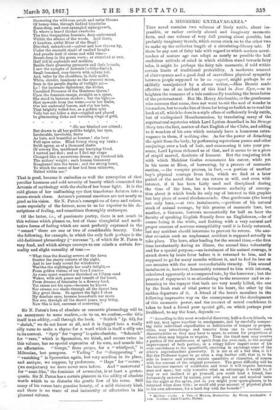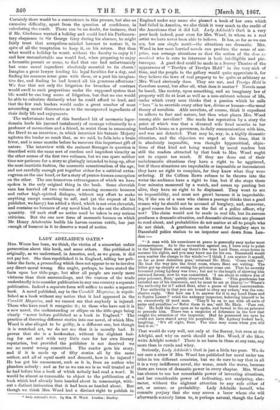A MESMERIC EXTRAVAGANZA.*
Tins novel contains two volumes of lively rattle, about im- possible, or rather entirely absurd and imaginary mesmeric facts, and one volume of very dull prosing about possible, but probably imaginary travels, which seems stuck on to the other two to make up the orthodox length of a circulating-library tale. If there be any sort of fairy tale with regard to which modern novel- readers of mature age can adopt as nearly as possible the half credulous attitude of mind in which children stand towards fairy tales, it might be perhaps the fairy tale mesmeric, if told within certain limits of traditional probability. A moderate amount of clairvoyance and a good deal of marvellous physical sympathy between people supposed to be en rapport, might perhaps be so skilfully manipulated by a clever writer,—Miss Bronte made effective use of an incident of this kind in Jane Eyre,—aa to heighten the romance of a tale confessedly touching the boundaries of the preternatural. But Mr. Henry Aitchenbie, or the gentleman who assumes that name, does not want to stir the soul of wonder in his readers, but to make fun of them for being so foolish as to read his book at all, which he does in a style often of sufficiently lively rattle, but of undisguised Munchausenism, by translating many of the supernatural mysteries which Lord Lytton described in his Strange Story into the fast, matter-of-fact English of the Clubs, and adding to it wonders of his own which certainly have a humorous extra- vagance in them, if nothing else. As for the power of detaching the spirit from the body, by performing mysterious passes and other conjuring,s over a lock of hair, and summoning it into your pre- sence, Lord Lytton sickened us of that, and it seems to us a piece of stupid marvel, destitute of humour. But the conjuring trick with which Melchior Gorles commences his career, while yet in his teens at Eton, of borrowing, by a process of mesmeric suction, — the vampire process, in fact, — a portion of another boy's physical courage from him, which we find at a later period of the novel that he can return at will, and even with interest, if it has been fairly used and disciplined during the time of the loan, has a humorous audacity of concep- tion about it which lends its only ray of interest to this graphic but lazy piece of moral rhodomontade. One gentleman (the hero) not only loses, — at two instalments, —portions of his natural stock of animal courage, by this process of mesmeric loan, but another, a German, borrows mesmerically for half an hour the faculty of speaking English fluently from an Englishman,—he of course losing it the while, and fretting with a very natural and proper amount of nervous susceptibility until it is fairly returned, lest any accident should intervene to prevent its return. On ano- ther occasion such an unpleasant accident is supposed actually to take place. The hero, after lending for the second time,—the first time involuntarily during an illness, the second time voluntarily and for a special purpose,—an instalment of his animal courage, is struck down by brain fever before it is returned to him, and is supposed to go for many months without it, and to feel its loss on one occasion with the most uncomfortable vivacity. This second instalment is, however, honourably returned to him with interest, calculated apparently at a compound rate, by the borrower ; but the process of repayment is so stimulating to the recoverer and so ex- hausting to the repayer that both are very nearly killed, the one by the fresh rush of vital power to his heart, the other by the sudden departure of it. A friend of the hero's moralizes in the following impressive way on the consequence of the development of this mesmeric power, and the amount of moral confidence it takes to lend a friend your special gift, on which perhaps you livelihood, to say the least, depends :— "'According to this most wonderful discovery, half-a-dozen friends, we will say, may agree together to amalgamate, and by carefully compar- ing their individual superfluities or deficiencies of temper or propen- sities, may interchange and transfer from one to another such characteristics as they may have to spare, in return for proportions of others they may happen to require. Thus the timid man may receive a portion of the exuberance of spirit from the over-rash, to the mutual improvement of both parties; or a stingy fellow impart some of his over-carefulness to the spendthrift, receiving in exchange some of the other's superabundant generosity. It is not at all a bad idea, is it ? But the Professor hopes to go even a step further still, that is, to be able to borrow and return certain quantities of character, of course with the consent of the original possessor. The great difficulty will be the immense amount of confidence and trust it will require between man and man ; but only conceive what an advantage it would be, if lazy or not inclined to go yourself, you could lend a friend, loss fortunately endowed by nature, your own good ear and musical taste for the night at the vent, just as you might your opera-glasses, to be returned when done with ; or could add your amount of physical pluck to his own allowance, for a hard day with the hounds!'" • Mekhior Gorles. A Tale cf Modern Mesmerism. By Henry Aitchenble. vols. London; John Camden Batten.
Certainly there would be a convenience in this process, but also an excessive difficulty, apart from the question of confidence, in calculating the result. There can be no doubt, for instance, that if Mr. Gladstone wanted a holiday and could lend his Parliamen- tary eloquence to Sir George Grey during his absence, he might fairly trust that scrupulous-minded baronet to restore it, in spite of all the temptation to keep it, on his return. But then what would a holiday be worth without the faculty to enjoy it? and how uncomfortable one would feel, when preparing to enjoy a favourite pursuit or scene, to find that one had unfortunately lost some moral ingredient absolutely essential to its charm ! Imagine a great lawyer lending his legal faculties for a day, and finding his common sense gone with them, or a poet his imagina- tive fire, and finding he had loaned all his generous affections ! We fear that not only the litigation for breaches of contract would swell to such proportions under the supposed system that life would be one long scene of litigation, but that no one would be able to calculate distinctly what he could afford to lend, and that the few rash lenders would make a great number of most astounding moral discoveries as to the unsuspected ingredients of their daily life and enjoyments.
The unfortunate hero of this barefaced bit of mesmeric leger- demain lends his (second instalment) of courage voluntarily to a professor of mesmerism and a friend, to assist them in summoning the Devil to an interview, in which interview his Satanic Majesty agitates the lender so much that, as we said, he falls into a brain fever, and is some months before he recovers this important gift of nature. The interview with the eminent Stranger in question is described with the same sort of careless and impudent vivacity as the other scenes of the first two volumes, but we can spare neither time nor patience for a story so glaringly intended to heap up, after the most inartistic fashion, the mesmeric sensationalism of the age, and not carefully enough put together either for a satirical extra- vaganza on the one hand, or for a story of prxter-human conception on the other. The one humorous extravagance of which we have spoken is the only original thing in the book. Some cleverish man has hurried off two volumes of amusing mesmeric bounces and rather high-spirited dialogue, without any effort to make anything except something to sell, and (at the request of his publisher, we fancy) has added a third, which is not even cleverish, and contains no bounces of any novel kind, to eke out the allotted quantity. Of such stuff no notice need be taken in any serious criticism. But the one new form of mesmeric bounce on which Mr. Henry Aitchenbie builds his harum-scarum rattle, has just enough of humour in it to deserve a word of notice.



































 Previous page
Previous page